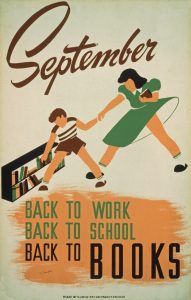 When the summer began, I had all sorts of plans. One of my plans was to add variety to my reading by reading more fiction. Yes, you read that right — more fiction. This was sparked by a conversation with my husband.
When the summer began, I had all sorts of plans. One of my plans was to add variety to my reading by reading more fiction. Yes, you read that right — more fiction. This was sparked by a conversation with my husband.
Husband: Why don’t you read something for fun for a change?
Me: I am reading something fun!
Husband: But all you read is nonfiction.
Yes, that’s me. I like nonfiction. This summer was going to be different, but here it is, time for school to start up again. Those lazy days of summer have led to me reading mostly… nonfiction. In my defense, there are a lot of really good nonfiction books that have been published this year! I won’t mention all of them, but I will tell you about three that I really loved.
“Lab Girl” by Jahren Hope
“Because I am a female scientist, nobody knows what the hell I am, and it has given me the delicious freedom to make it up as I go along.” Jahren is a botanist who is passionate about her field. She weaves the insights she discovers in the lab and in the field seamlessly with her personal day-to-day life. “Lab Girl” is one of those odd books that is part science book, part memoir, with a bit of philosophy thrown in, and it reads more like poetry at times. “Each beginning is the end of a waiting. We are given exactly one chance to be. Each of us is both impossible and inevitable. Every replete tree was first a seed that waited.”
“Tribe: On Homecoming and Belonging” by Sebastian Junger
This is another memoir-ish book combined with journalism and science. At only 192 pages, Junger has written a very concise book about post-traumatic stress disorder in our society, including the Native American population and returning war veterans, as well as our society as a whole. “Humans don’t mind hardship, in fact they thrive on it; what they mind is not feeling necessary. Modern society has perfected the art of making people not feel necessary. It’s time for that to end.” I really connected with the longing for community that this book invokes.
“The Gene: An Intimate History” by Siddhartha Mukherjee
Once again, this is a memoir mixed with science, or maybe it’s science mixed with memoir. (I think I’m sensing a pattern here.) Mukherjee traces the history of the gene from Aristotle, Mendel and Darwin, on through the German and American eugenics programs, to Watson and Crick and modern gene therapy. This is a very personal odyssey for Mukherjee because of mental illness that runs in his family. He delves into the factual science of genes and our understanding of them and examines the ethics of genetic manipulation. This is a very moving account of a very complex topic, and at times it borders on the poetic: “History repeats itself, in part because the genome repeats itself. And the genome repeats itself, in part because history does. The impulses, ambitions, fantasies, and desires that drive human history are, at least in part, encoded in the human genome. And human history has, in turn, selected genomes that carry these impulses, ambitions, fantasies, and desires. This self-fulfilling circle of logic is responsible for some of the most magnificent and evocative qualities in our species, but also some of the most reprehensible. It is far too much to ask ourselves to escape the orbit of this logic, but recognizing its inherent circularity, and being skeptical of its overreach, might protect the week from the will of the strong, and the ‘mutant’ from being annihilated by the ‘normal’.”
I will keep trying to add more fiction to my reading list, but when there is nonfiction this interesting, how can I resist?


